Could rodents help in the fight against tuberculosis?
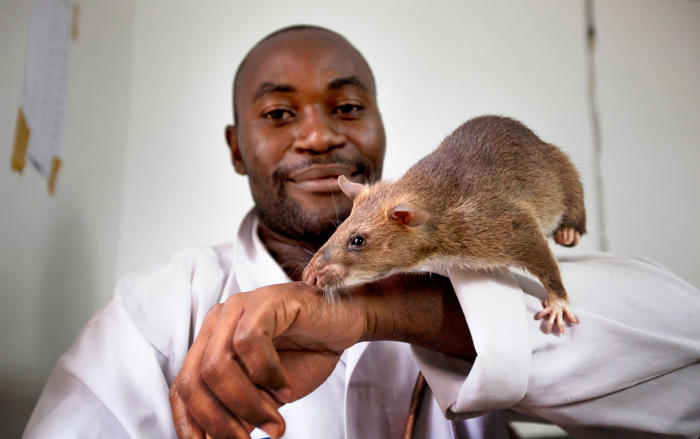
A researcher with one of the 50 giant African pouched rats working to diagnose TB in patients across Africa - APOPO
Eugene has just returned home from a long day at work. His job is demanding – he saves lives, after all.
As he tucks into his dinner – a modest serving of nuts, seeds, and sardines – he feels satisfied with his day’s achievements.
Except he doesn’t, because he’s a rat. And although rats are sentient beings, their brains can’t quite process the feeling of job satisfaction.
Eugene and his esteemed colleagues (e.g. Lois, Campbell, and Eunice) – are some of around 50 giant African pouched rats working to diagnose tuberculosis (TB) infections in patients across Africa.
The bacterial disease claims roughly 1.3 million lives per year, over a third of which are on the African continent. Symptoms include a prolonged cough, chest pain, weakness, weight loss and fever before it eventually kills.
TB is almost always curable if detected early on – but in sub-Saharan Africa fewer than half of patients will ever receive a diagnosis because clinics and laboratories are so thinly spread.
This is where Eugene and his furry friends might provide a solution.
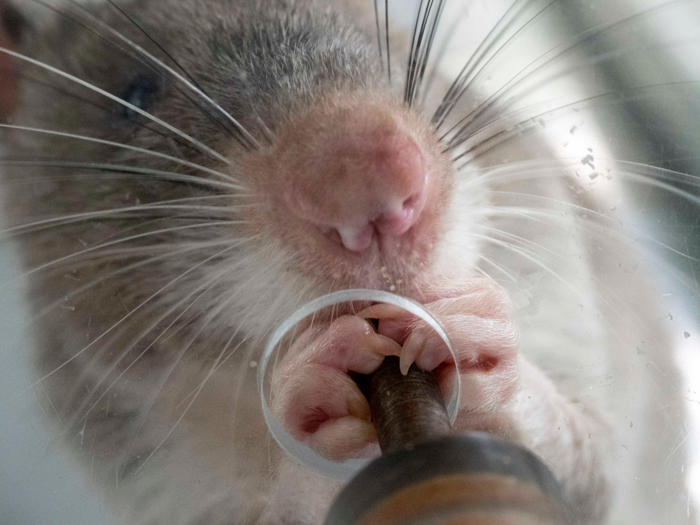
The rodents have so far screened an impressive half a million TB samples - APOPO
Although rodents are infamous reservoirs of disease (the bubonic plague, or ‘Black Death’ which killed off half of Europe in the 1300s was transmitted via rats) this team of super-sniffers are quite the opposite.
The rodents have so far screened half a million TB samples in Tanzania, Ethiopia, and Mozambique – all of which rank in the top 30 countries with the highest burden of the disease.
The creatures, which can grow to be roughly the size of a dachshund, act as a second-line defence, double-checking negative tests from local clinics to see if they might have missed the presence of the TB bacteria in samples.
365 days a year, couriers on motorbikes collect TB-negative samples from clinics in the countries’ cities, towns, and villages and bring them to the rats, which are based in central labs operated by the Belgian charity APOPO.
You may have heard of them – the non-profit’s specially trained rodents are most famously used to detect unexploded landmines in current and former warzones like South Sudan, Angola, Cambodia, and Vietnam.
When the World Health Organization declared a TB emergency in Africa in 2005, the charity, which was already training its creatures in Tanzania before shipping them off to conflict areas, wanted to see if they could help.
The answer was yes – TB bacteria emits a strong tar-like scent, which was found to be easily identifiable to the giant African pouched rat.
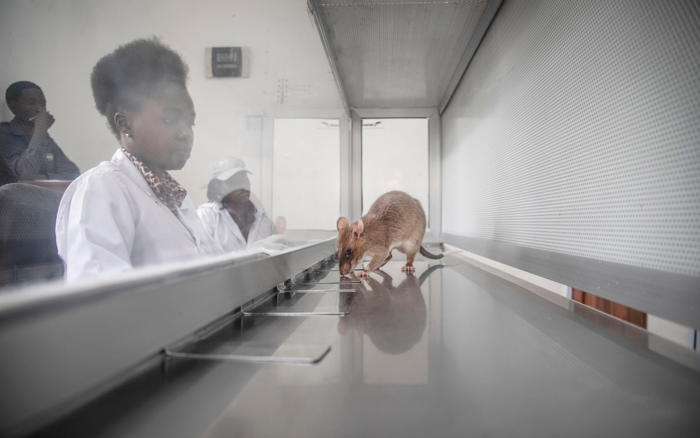
The rats take turns sniffing tiny trays of mucus - APOPO
The rats take turns sniffing around 100 tiny trays of mucus each, which takes them just 20 minutes.
Samples are laid out on a tray in the rats’ cages.
The rodents pace up and down, and hover over samples they detect as positive for approximately three seconds.
They won’t do it for free though – every positive finding comes with a treat, which usually consists of avocados, bananas, or sardines (Eugene loves a banana smoothie, apparently).
Those results are then verified by human technicians – but the rats are almost always right, with a 90 per cent accuracy rate.
Since 2008, when the project was first launched, the rodents have found 30,000 cases that had been diagnosed as false negatives, potentially saving up to half a million lives (the infectious nature of the disease means that just one person can infect upwards of 15 others).
In one study, APOPO’s rats were put to the test at the charity’s main research lab in Dar Es Salaam.
They were tasked with analysing 10,523 samples from patients whose tests had already undergone traditional screening. Of these, 13.3 per cent had already been identified as TB-positive.
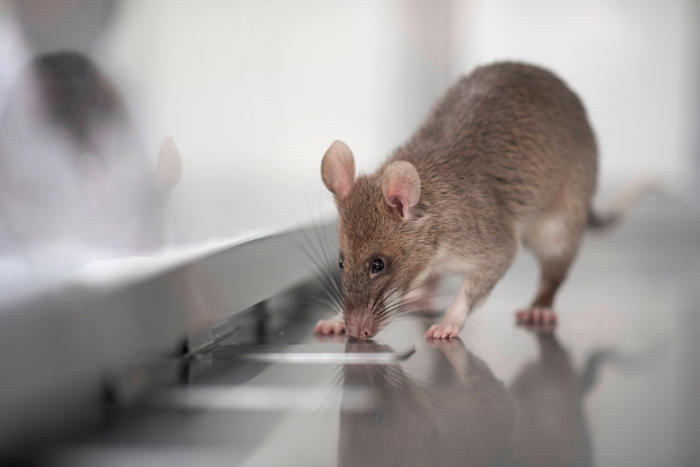
The rats have a 90 per cent accuracy rate - APOPO
The rats then detected an additional 620 cases, which subsequent technician re-evaluation confirmed to be positive – increasing the detection rate by nearly 50 per cent.
“In most developing countries, TB is detected using a method known as spectrum smear microscopy,” explained Tefera Agizew, who runs APOPO’s TB programme.
The method was invented in the 1880s, and has changed little since then.
Technicians examine phlegm samples under a microscope to spot the bacteria responsible for tuberculosis.
And under perfect conditions, it’s extremely accurate.
But a lack of skill, faulty equipment, and the fact that it doesn’t work particularly well on HIV-positive patients means that it misses up to 60 per cent of cases in sub-Saharan Africa.
The WHO recommends that countries use rapid molecular diagnostic tests (RMDT) instead – which is essentially the same as a PCR test.
But this poses another problem for low-income countries: its cost.
Whilst the rat method comes in at $1.1 per sample, RMDTs cost around $18 – a problem for many of the struggling health systems in sub-Saharan Africa.
“In sub-Saharan settings, the diagnostics are incredibly poor, and it’s also expensive – we wanted to fill the gap and raise the detection rate and thought our rats could help,” explained Agizew.
“Smear microscopy tests also take 4-5 days, but we deliver clinics the rat results in 24 hours. If a patient comes in, they’ll know their TB status by the next morning,” he added.
“The rats are cheap to operate – we feed them bananas and avocados, all of which are sourced locally – speed, sensitivity, and cost-wise they really are better than what most of Africa is currently using.”
It’s not the first time animals have been used in disease detection.
Dogs, rats, and even ants have been used to find various cancers by sniffing people’s skin, bodily fluids, and breath. Agizew says that APOPO’s rats could be used to detect more diseases, too, like salmonella and brucellosis.
But not everyone is convinced.
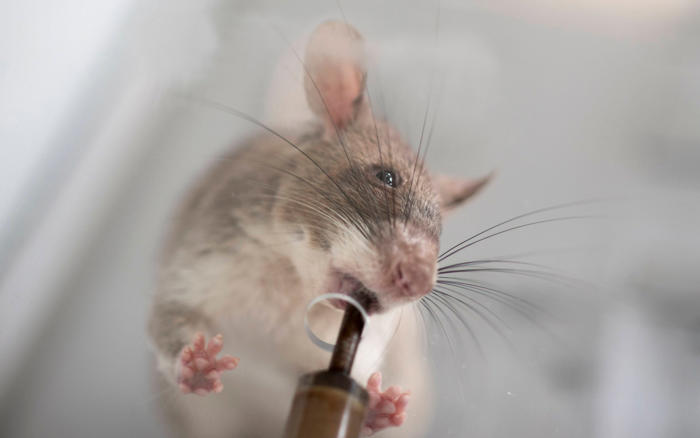
APOPO believes its rats could be used to detect more diseases - APOPO
“The main concern is the number of individuals that the rats would flag as positive where no other evidence would support that diagnosis – a re-evaluation by a human might be confirmation bias,” said Mike Barer, Professor of Clinical Microbiology at the University of Leicester.
“A standard TB treatment course is six months and there is an adverse reaction rate within that.
“Possible side effects include liver and eye damage, and so it’s never a good idea to treat someone who isn’t unwell,” Prof Barer added.
“That being said, smear microscopy can miss a lot of cases, particularly because in Africa there are often difficulties including other bugs contaminating the samples. You also need a reasonable level of technical expertise to have confidence in the results, so there are definitely problems,” he explained.
Experts have also noted that the rats cannot differentiate between TB and drug-resistant strains.
Agizew and his team at APOPO, however, think their four-legged friends are an important contribution to the fight against tuberculosis, and hope to expand their work in future.
“In Tanzania and Ethiopia, TB is declining at an annual rate of 5 per cent – which is not enough. Our rats are contributing to a faster decline, which is what is needed if we are to eliminate the disease,” he said.
“In an ideal world, we would want to expand – 2.5 million cases are coming each year from India, if we could start a programme there, I think it would make a huge difference,” Agizew added.
Protect yourself and your family by learning more about Global Health Security
Sign up to the Front Page newsletter for free: Your essential guide to the day's agenda from The Telegraph - direct to your inbox seven days a week.
